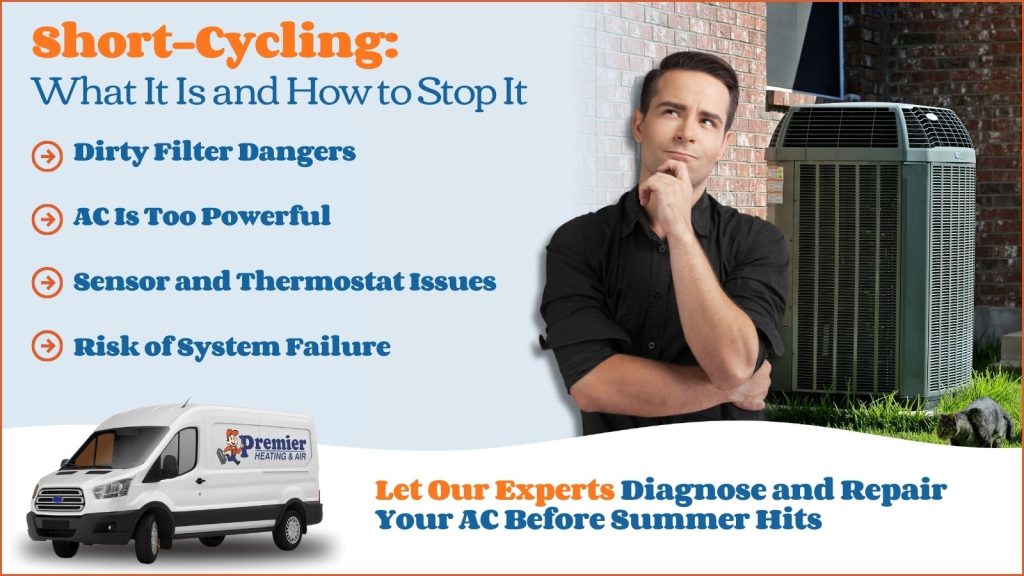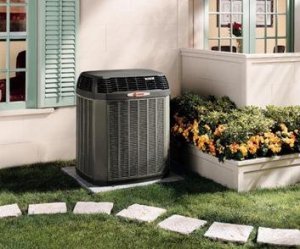Does your air conditioner seem to run for just a few minutes at a time—only to shut off and start again shortly after? This frustrating issue is known as short-cycling, and it’s more than just a nuisance. At Premier Heating & Air, we often see this problem in homes, and we know firsthand how it can harm your comfort, your energy bills, and even the lifespan of your AC system.
We’ll break down what short-cycling is, why it happens, and—most importantly—what you can do about it, including calling us for AC repair in Warner Robins, GA.

What Is Short-Cycling?
Short-cycling refers to an air conditioning system that turns on and off too frequently—before it’s completed a full cooling cycle. Instead of running steadily until your home reaches the desired temperature, the system starts and stops in rapid bursts. In most cases, the AC will only run for 5–10 minutes at a time.
While this may seem like a minor inconvenience, it’s actually a sign that something isn’t working the way it should.
Why Short-Cycling Is a Big Problem
Short-cycling isn’t just annoying—it can have real consequences for your comfort and your HVAC equipment.
Here’s why it matters:
- Reduced Comfort: A system that shuts off too soon doesn’t have time to properly cool and dehumidify your home. You might notice hot spots, clammy air, or inconsistent temperatures.
- Higher Energy Bills: Constantly restarting draws more energy than a properly running system. That means your energy costs can climb, even if your home isn’t getting any cooler.
- Increased Wear and Tear: Frequent cycling puts extra strain on the compressor—the most expensive part of your AC. If left unchecked, short-cycling can lead to premature failure and costly repairs.
- Shorter System Lifespan: Over time, all that extra wear can shave years off your system’s life.
Common Causes of Short-Cycling
Several issues can cause your AC to short-cycle. Some are simple fixes, while others may require professional repair or even replacement.
1. Dirty Air Filter
A clogged filter restricts airflow, causing the system to overheat and shut down prematurely. Replacing your air filter every 1–3 months is a simple way to prevent this.
2. Thermostat Issues
A poorly placed or malfunctioning thermostat can give your AC false readings. If it’s located in direct sunlight or near vents, it may sense your home is cooler than it really is—causing the system to shut off too early.
3. Low Refrigerant
If your system is low on refrigerant, often due to a leak, it can’t cool efficiently and may overheat or short-cycle. Low refrigerant should always be handled by a licensed HVAC technician.
4. Oversized Air Conditioner
Bigger isn’t always better. If your AC is too powerful for your home, it will cool the space too quickly and shut off—before humidity is properly removed. This can lead to short-cycling, discomfort, and even mold growth from excess moisture.
5. Electrical or Control Board Problems
Faulty relays, damaged circuit boards, or loose wiring can interfere with the normal operation of your system. These issues often require diagnostic testing from a professional.
What You Can Do About It
Short-cycling isn’t something to ignore. If you suspect your AC is turning on and off more frequently than it should, take these steps:
- Check the thermostat: Make sure it’s set to “cool” and isn’t placed in a location that gets hit by direct sunlight or warm air from appliances.
- Replace the air filter: A dirty filter can cause multiple issues, including overheating and short-cycling.
- Schedule professional maintenance: Our team at Premier Heating & Air can inspect your system, check refrigerant levels, test components, and identify the root cause.
- Consider system replacement: If your system is oversized or aging, a properly sized, energy-efficient replacement may be the best long-term solution.
If your AC is shutting down too soon—or acting strangely in any way—don’t wait. Contact Premier Heating & Air today to schedule a diagnostic or maintenance appointment.


